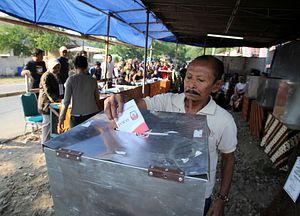Java and Sumatra dominate Indonesia. Even when it comes to local elections, where millions outside of those two islands vote for local representation, those results typically do not carry the same weight in analysis or presidential race fortune-telling. South Sulawesi, home to the fifth-largest city in the archipelago, arguably bucked the trend this year, with two of the most compelling races attracting widespread attention, albeit for very different reasons.
A Tight Race, a Wide Win
Dynasties – and attempted dynasties – are a common fixture in Indonesian politics, and the South Sulawesi gubernatorial race has heralded at least a temporary break from the top for one such family. Outgoing governor Syahrul Yasin Limpo, who had served the maximum two terms, is the second generation in a dynasty established by his father, who had served at the district level. Brother Ichsan Yasin Limpo was tipped to carry the baton and after receiving the mandatory support to run as an independent, a win looked possible but failed to eventuate.
Instead, the tight four-way race was taken out by Nurdin Abdullah, the sitting district head in the coastal district Bantaeng, and running mate Andi Sudirman. Abdullah has made a name for himself as anti-corruption activist receiving the prestigious Bung Hatta Anticorruption Award in 2017 for his work in his home district. The award commemorated a decade of developing the district as its head eventually moving it from the Village Ministry list of underdeveloped areas. The Jakarta Post reported the annual per capita income in the district more than doubled during his leadership with the most recent 2010 figures showing Rp. 34.06 million (US$2,373.98). With quick count results showing between 40 and 43 percent of the vote in favor of the pair it’s clear that like in West Java with former Bandung mayor Ridwan Kamil, voters are hoping the hard work put in on a local level can be replicated across the province.
The win is also one of few shining lights for the Indonesian Democratic Party of Struggle (PDI-P), the party of President Joko Widodo. While parties within the governing coalition have reaped wins across the country, PDI-P has fallen on its face in most major races. PDI-P had supported the Abdullah-Sudirman ticket early on in the race – announcing in October last year. This is a massive departure from the hesitant and transparent to a fault process in securing endorsement seen elsewhere, particularly in Jakarta last year. If there’s one lesson the party should take from the elections is this: choose a candidate wisely and choose early.
Polling had been erratic during the campaign period with no clear winner. Ichsan had at times polled ahead suggesting a much closer race than the eventual 20 percent or less quick count result showed. Interestingly, this is one of few major races in which results departed dramatically from polling.
Makassar Has Bigger Problems
Still, Golkar branding has not helped Munafri Afiruddin in his run for mayor of the city of Makassar. Incumbent Mohammad Ramdhan Pomanto had attempted to run but was ruled ineligible by the Supreme Court, leaving Afiruddin unchallenged. Quick count results from Celebes Research Center show Afiruddin securing just over 46 percent of the vote – losing to nobody. The “blank box,” in which a candidate loses to a no-name write-in option, is unheard of in Indonesian politics and is now the subject of an intense investigation by the electoral commission (KPU).
The local wing of the Independent Journalist Alliance issued a statement shortly after the vote on June 27 alleging that media were blocked from entering the usually free and open vote counting. Speaking to Tempo on the Saturday, head of the Makassar alliance Qodriansyah Agam Sofyan said journalists had been tipped off to irregularities via social media. He alleges that official results of three districts differed greatly from what had been spread online.
Pointing to one example in Tamalate district, Sofyan says official data shows 138 voters went for the blank box option while 94 voted for Afiruddin. Investigations meanwhile showed the candidates had received 238 votes.
Commissioner of Makassar’s KPU, Abdullah Mansyur, clarified Saturday that there has been a problem with data input, and that the quick count results are not considered valid. Allegations are rife that election organizers are responsible for voter manipulation, the means of which are still unclear, prompting the announcement of an intense investigation.
For the KPU, this is a disaster. But the fact remains that with 171 races run across the country in Indonesia’s third simultaneous regional elections, one instance of impropriety ought to be kept in perspective. One should not downplay the degree to which this is a cause for concern, but, similarly, the institution’s performance ought not to be judged by this case alone.
This article has been updated to correct references to Nurdin Halid to Nurdin Abdullah.

































